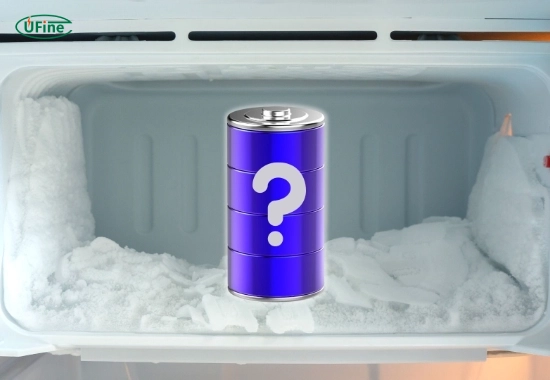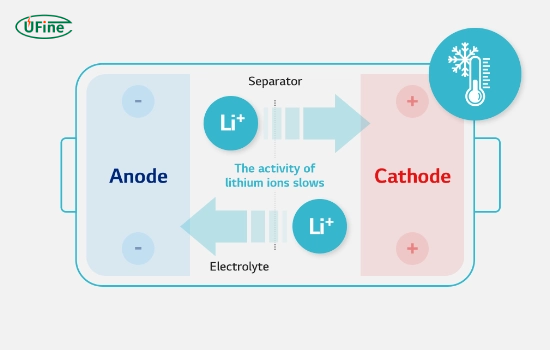Should batteries be stored in the fridge? No, batteries should not be stored in the refrigerator. The cold and humid environment can cause moisture buildup, leading to corrosion, short circuits, and even dangerous malfunctions. Most modern batteries last longer when stored in a cool, dry place at room temperature.
This comprehensive guide will explore whether putting batteries in the refrigerator is beneficial or potentially dangerous. We’ll cover how different types of batteries react to temperature, the science behind battery chemistry, and the safest way to store them for long-lasting performance.
Part 1. What does storing batteries in the fridge mean?
Storing batteries in the fridge means placing unused batteries, such as alkaline, lithium-ion, NiMH (nickel-metal hydride), or carbon-zinc, inside a refrigerator, usually hoping to extend their shelf life.
The idea behind this practice is that cooler environments slow down the chemical reactions inside batteries, reducing self-discharge and increasing longevity. But this approach isn’t always practical, and in many cases, it can be harmful.
Part 2. Why do people think batteries last longer in cold storage?
This belief goes back to older battery chemistries like carbon zinc, which were prone to rapid self-discharge, especially in warm environments. In that era, keeping batteries cold helped to slow energy loss.
However, modern batteries are more advanced. Today’s alkaline, lithium-ion, and rechargeable batteries are designed to handle storage at room temperature. Cold storage can now do more harm than good.
Part 3. How do batteries lose charge over time?
All batteries suffer from self-discharge, slowly losing stored energy even when not in use. The rate of self-discharge depends on:
- Battery Chemistry
- Ambient temperature
- Humidity
- Battery age
- Storage conditions
Here’s a quick look at self-discharge rates by type:
| Battery Type | Monthly Self-Discharge Rate |
|---|---|
| Alkaline | ~0.3% |
| Lithium (primary) | <0.1% |
| NiMH (standard) | 20–30% |
| NiMH (low self-discharge) | 1–3% |
| Li-ion (rechargeable) | ~2–3% |
Higher temperatures generally increase self-discharge, while cooler (but not freezing) environments slow it down. But refrigeration introduces new risks.
Part 4. What are the risks of storing batteries in the fridge?
So, should batteries be stored in the fridge?
No, batteries should not be stored in the fridge. The cold environment and high humidity can cause condensation, leading to corrosion, leakage, and even short circuits.
Let’s explore the risks in detail:
- Condensation
When you remove cold batteries from the fridge, they come into contact with warm, humid air. This can cause moisture to form on the battery casing and terminals. - Corrosion
Moisture + metal = corrosion. Over time, this may damage the terminals, reduce conductivity, or cause the battery to leak. - Short Circuits
Suppose moisture enters the battery or forms a bridge between terminals. In that case, it can lead to internal shorts, rendering the battery useless. - Safety Hazards
In extreme cases, especially with rechargeable lithium-ion batteries, temperature swings can lead to thermal runaway, bloating, or fire risk. - Reduced Performance
Cold temperatures can reduce battery output temporarily. Devices may power off sooner or fail to start at all.
Part 5. What’s the best way to store batteries?
Instead of using your fridge, here’s how to store batteries the right way:
- Keep them cool, dry (60–75°F / 15–24°C).
- Avoid sunlight, heaters, and other heat sources.
- Store batteries in original packaging or a battery case.
- Don’t mix types (e.g., lithium with alkaline).
- Label and rotate your supply (the oldest gets used first).
- Remove batteries from unused devices to prevent leaks.
Part 6. Are there exceptions to cold storage?
Yes—but only in specialized industrial or military scenarios. Some laboratories or military operations may store rare battery types at low temperatures to preserve them for 10+ years.
However, such batteries are:
- Sealed in moisture-proof containers
- Stored in temperature-controlled environments
- Monitored closely for safety
For the average person? There’s no need to refrigerate batteries.
Part 7. How different battery types react to cold?
Different battery chemistries react differently to low temperatures. Let’s explore the science before we look at a comparison table.
Alkaline batteries
It works well at room temperature.
Performance drops below 0°C (32°F).
Cold can harden internal components and reduce current flow.
Lithium (non-rechargeable)
Perform better than alkaline in the cold.
It can operate at -20°C (-4°F) or lower.
Still, moisture exposure in a fridge can lead to damage.
Lithium-ion (rechargeable)
Very sensitive to cold.
Charging below 0°C (32°F) can permanently damage the battery.
Storage below freezing can lead to capacity loss and swelling.
NiMH (nickel-metal hydride)
Rechargeable but high self-discharge unless low self-discharge models.
Don’t handle freezing well.
Condensation can easily cause shorts and corrosion.
NiCd (nickel-cadmium)
Tolerates cold better than NiMH.
Still not fridge-safe due to moisture.
Now, let’s summarize this in a realistic comparison table:
| Battery Type | Safe Storage Temp | Cold Weather Use | Fridge Storage Safe? | Risk Level in Fridge |
|---|---|---|---|---|
| Alkaline | 15–25°C (59–77°F) | Limited below 0°C | ❌ No | Moderate (condensation) |
| Lithium (Primary) | -20–30°C (-4–86°F) | Good in cold | ❌ No | Moderate (moisture risk) |
| Lithium-ion (Rechargeable) | 15–25°C (59–77°F) | Poor below 0°C | ❌ Never | High (fire, swelling) |
| NiMH | 10–25°C (50–77°F) | Poor in cold | ❌ No | High (shorts, rust) |
| NiCd | 0–25°C (32–77°F) | Fair in cold | ❌ Not recommended | Moderate |
Part 8. Can freezing batteries damage them?
Absolutely. Freezing batteries is dangerous, especially for lithium-ion and rechargeables.
Here’s what can happen:
- Internal liquids freeze, causing expansion and pressure.
- Case swelling or rupture.
- Electrolyte breakdown.
- Increased risk of explosion or fire when recharged.
Even alkaline and lithium primary batteries can leak or degrade if frozen and thawed repeatedly.
Part 9. How to extend battery life without a fridge
Want your batteries to last longer? Try these safe and practical tips:
- Buy fresh stock from reputable sellers.
- Choose low self-discharge models for rechargeables.
- Store at room temp in a dry location.
- Avoid battery contact with metals (which can cause shorts).
- Label your batteries and use a first-in, first-out system.
- Remove batteries from idle devices (like flashlights in storage).
- Charge regularly if storing lithium-ion batteries.
Artikel Terkait: How to Store LiPo Batteries?
Part 10. FAQs
Should batteries be stored in the fridge to make them last longer?
No. Cold storage can cause condensation, corrosion, and performance loss. Modern batteries do best in dry, room-temperature conditions.
Is it dangerous to store lithium-ion batteries in the fridge?
Yes. Lithium-ion batteries are sensitive to cold and moisture. Storing them in a refrigerator can cause swelling, leaking, or fire hazards.
What is the best way to store rechargeable batteries?
Store them charged in a dry, cool place, ideally between 15–25°C (59–77°F). Avoid full discharge and extreme heat or cold.
Do batteries go bad if not refrigerated?
No. If stored properly, most batteries will retain charge for years without refrigeration.
Can I store batteries in the freezer for emergencies?
No. Freezing is risky and can damage most battery types. Buy batteries with a long shelf life for emergencies and store them dry.
Related Tags:
More Articles

How to Choose the Right Electric Fence Battery?
Choosing the right electric fence battery is key to security. This guide helps you pick a reliable farm, garden, or animal power source.
What Are Lithium Pouch Cells?
Explore how lithium pouch cells work, their structure, advantages, and uses. Learn from a trusted supplier like Ufine Battery for custom lithium solutions.
The Evolution of Ring Battery Pack Technology in Lithium Battery Manufacturing
Ring battery packs are reshaping lithium battery tech. Discover their evolution, key uses, and why they matter for the future of energy storage.
Lithium vs Lithium Salt: What’s the Difference?
Lithium is a pure metal, while lithium salts are stable battery compounds. Learn their key roles and differences in battery manufacturing.
What You Need to Know About AA 3.6V Lithium Battery
Learn all about AA 3.6V lithium batteries—voltage, size, capacity, uses, and the best replacements. Discover why they’re powerful, and highly reliable.





